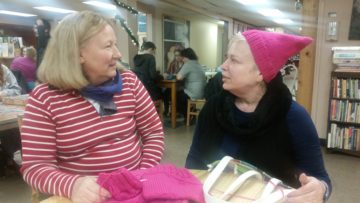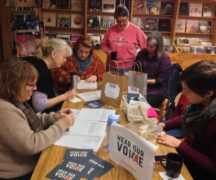By JAN LARSON McLAUGHLIN
BG Independent News
Many of these women already did their marching. They marched against the Vietnam War, for the Equal Rights Amendment, for reproductive rights, and for gay rights.
But this weekend, they will be returning to the streets in Washington, D.C., and cities across the nation to fight the same battles they thought they put behind them years ago.
“I’m stunned that we’re fighting this fight again,” said Ginny Stewart, of Bowling Green, who will be traveling to Los Angeles to join in that city’s march with her 87-year-old mom.
Though billed as “women’s marches,” the gatherings are open to anyone worried about the direction of the nation under Donald Trump, who will be sworn in as president the day before.
“We’re in peril. Our women’s rights are in peril,” Stewart said. “I hope the message is sent that we’re not going to sit back and let this happen. We will be heard. We won’t sit back.”
A dozen women from Bowling Green sat down Monday to share why they will be marching on Saturday.
They come from different professions – a teacher, a business owner, a realtor, an art gallery director, a librarian. But they share far more than their gender. They are deeply troubled by the direction of their nation and they aren’t going to sit quietly as the progress they fought for is lost.
Debbie Dalke said the march has given her a positive focus beyond inauguration day. “This has made it more bearable.”
“I remember protesting the Vietnam War, so I’m a regular,” Dalke said. “There are too many groups of people Trump has put in jeopardy. I just reached a point where I said, ‘I’m going.’”
“In my mind, a great America is not sexist. A great America is not racist. A great American is not homophobic,” Dalke said.
Like others around the table, Nancy Eames did not look like a radical feminist – just someone standing up for rights that she sees at risk of being lost. This will be her fifth march on D.C., starting in 1986 for reproductive freedom. “The feeling of being in that crowd is a transformative experience,” she said. “I just figured younger people would take over.”
For others joining in on Saturday, this is the first time they have been compelled to march.
“I just can’t stay silent anymore,” said Kathy Pereira de Almeida, whose husband and children are marching with her in Ann Arbor, Michigan. “I’m going in solidarity with other women and women’s rights. I hope voices are heard.”
Pereira de Almeida has been channeling her energy to knit “pussy hats” like those being worn by many marchers. She and other members of a Bowling Green knitting club have been making many of the pink hats as a visual reminder of Trump’s language when talking about groping women.

Kathy Pereira de Almeida (left) gives “pussy hat” for march to Kim Sockman
On Monday, Kim Sockman tried on one of the hats to wear on Saturday. She has been thinking about how to explain why she is marching for the first time in Washington, D.C. She found her words from iconic Civil Rights leader Congressman John Lewis, who Trump accused through Twitter of being “all talk.”
“It was hard to put into words,” Sockman said. “But you have to speak up when you see something wrong.”
Across the nation, nearly 400 marches are being planned on Saturday. The buses to Washington, D.C., from Ohio are already full. And Dalke is fueled by reports that while the bus permits at RFK stadium for the inauguration number 200, the bus permits for the march are as high as 1,200.
And “for every person marching, there are at least 10 or 20 at home” who support them, Pereira de Almeida said.
The marches were organized after the rhetoric of Donald Trump’s campaign insulted, demonized, and threatened immigrants, Muslims, people who identify as LGBTQIA, people of color, people with disabilities, and survivors of sexual assault.
“We stand together, recognizing that defending the most marginalized among us is defending all of us,” the official march statement reads.
Some women gathering on Monday were not comfortable having their names published. One works for a publicly funded operation, another works in a conservative industry where she feared her business would suffer if she spoke openly.
“I just want the new administration to know that people are watching and listening,” one of them said. “Democracy is participatory,” and it must involve more than just voting since that proved pointless this election, she added.
The other woman, co-owner of a business, is taking her 12-year-old daughter to the national capital for the march. The woman grew up in a poor, conservative family, and has been labeled a “liberal elitist” at work because she didn’t support Trump.
“I took the day off after the election, and sat and cried,” she said. “I thought there has to be something else I can do.”
After the election, her daughter approached her about the family’s Hispanic heritage. “My daughter asked if she should try to hide it,” the woman said. “It’s ugly.”
“We’ve never had such a high official get on TV and call Mexicans rapists,” Dalke said.
Another mom, Rebecca Skinner Green, faced concerns about her two mixed-race sons, who grew up in a nation led by an African-American man. “Now suddenly we’re living in a world….” She couldn’t finish the sentence. One of her young sons tried to console her after the election by saying, “Mom, it’s only four years.”
Skinner Green grew up in Northern California with a hippie mom who started a kindergarten program for Black Panther children, and who marched with farm labor organizer Caesar Chavez.
“This man cannot represent me,” she said of Trump. “This is completely the wrong direction. We’re going backwards.”
It’s that sliding back that so worries Marcia Rybczynski, who will be marching in Ann Arbor. She worries about the environment, health care, education and women’s rights.
“Let him do his tweets about it,” she said. “We at least have to make our voices heard.”
Jacqui Nathan, who attended her first sit-in during college against the Vietnam War, couldn’t sit back either when she saw the women’s marches being organized.
“This man is a liar and a cheat,” Nathan said. “I do not respect this man.”
Sandy Rowland, who has attended her share of protests, is not expecting Trump to suddenly become presidential after the inauguration. “There are a lot of unjust acts about to be committed by our next president,” she said.
So on Saturday, she will again put on her marching shoes.
“Never be afraid of doing something that’s right,” Rowland said. “My hope is the march crowd far outweighs the inauguration.”
Skinner Green, who plans to wear a sash similar to those worn by suffragettes long ago, cannot pinpoint one issue that pushed her over the edge to march. She has no problem rattling off so many comments from Trump that she found disturbing – about shooting someone and getting away with it, about groping women, belittling of a person with physical disabilities, and smearing of Hispanics.
“It was an avalanche that just kept coming. You couldn’t turn it off,” she said.
Dalke worries about health care for people like her college students. “Students struggle as it is to pay tuition,” she said.
Nathan said she is delaying her retirement out of concern about health care for her spouse, Kay Chapman. “I’m just afraid there won’t be any available to us.”
Eames is concerned about those being appointed by Trump. “The lack of qualifications in the cabinet is appalling,” she said.
Rybczynski believes education is at a great risk. “You can’t keep taking money away from public schools,” and provide quality educations, she said.
The women fear one of the biggest losers to suffer irreparable harm will be the environment. “The damage that can happen to the environment in the next four years will be irreversible,” Eames said.
And bigger still are concerns about Trump’s stability and willingness to engage in nuclear war, Chapman said.
The women are realistic about the outcome from the marches. Though Pereira de Almeida has relatives in Brazil, where the nation’s leader was ousted after marches in the streets, she is just hoping that Saturday’s marches give her and millions of other women a voice.
“I want to be there and be counted,” Skinner Green said. “That may sound stupid. But I want to be seen.”
Dalke hopes the message makes it to politicians. Chapman agreed, “I think solidarity is really important.”
Eames wants the message to go to the next generation. “I want to show the young people in my family that you need to let your voice be heard.”
And Nathan hopes the marches are the beginning of something bigger. “I just hope this is the start of getting organized. That it starts with waves and ripples.”
Some of the more seasoned marchers around the table worry that younger women may not realize what is at risk. They have not had to fight the same battles for basic rights that are now taken for granted.
“We did the work and the younger generation has benefitted from that work,” Stewart said. “I don’t think they realize how hard it was to get. So I’m doing this for my granddaughter and my nieces.”




